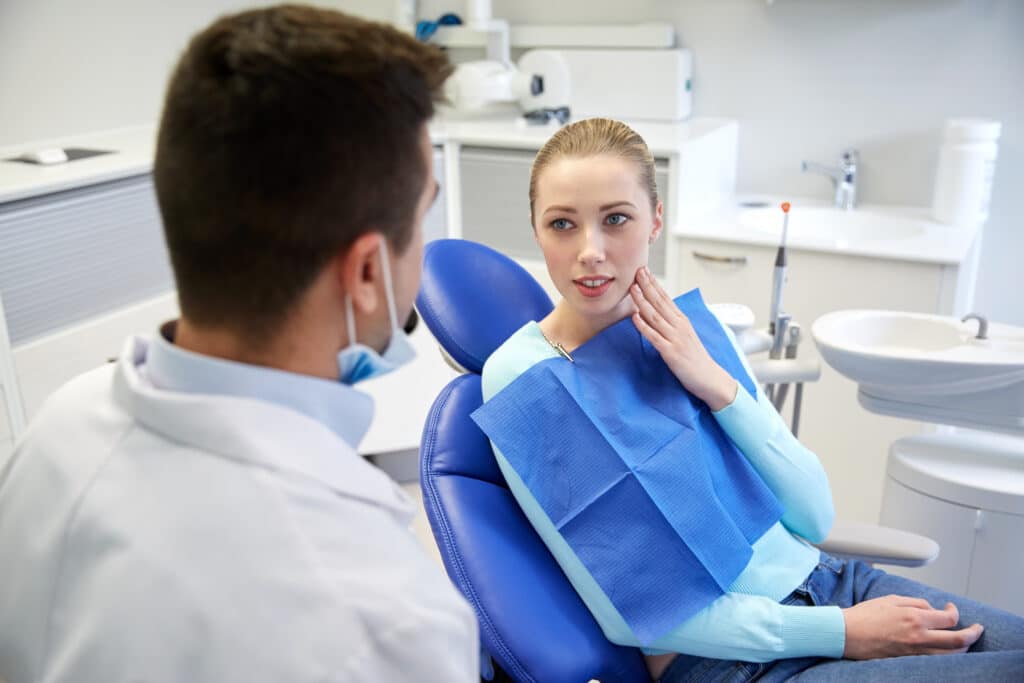If you whiten your teeth, you may experience tooth sensitivity after the fact. This can occur whether you use over-the-counter whitening products or whether you see a dentist for a professional whitening treatment. It’s only natural to be alarmed by tooth sensitivity, as it often indicates a dental problem.
Here is what you need to know about tooth sensitivity after whitening.

It’s Common
Tooth sensitivity after whitening is a common side effect. Said sensitivity is usually mild. You may be sensitive to hot or cold stimuli. You may also experience a dull ache.
However, you shouldn’t be in intense pain or discomfort. The sensitivity also shouldn’t last longer than a few days. If either of these are the case, this may indicate an underlying issue, such as exposed tooth roots, ill-fitting/damaged fillings, gum disease, worn-down/thinned/damaged enamel, and the like. As such, if your tooth sensitivity after whitening persists or is intense, it’s best to consult with your dentist.
Why Are Teeth Sensitive After Whitening?
Teeth are typically sensitive after whitening due to peroxide-based products. Hydrogen peroxide and carbamide peroxide are used in whitening products, but can be damaging to enamel and gums in high doses. They can make enamel temporarily more permeable in small amounts.
Peroxide releases free radicals when it oxidizes stains. This chemical reaction lightens teeth by cracking down on existing surface stains, but it can inflame the pulp or nerve inside the tooth, leading to sensitivity. Peroxide leaves teeth more porous after, which exposes soft dentin (a sensitive part of the tooth) and nerves. It is important to use whitening products correctly, in order to avoid damage from improper use or high doses.
Tooth enamel damage is often permanent, so you must be careful and ensure you are taking proper care of your teeth.

Why Do Your Gums Hurt After Tooth Whitening?
Gingival irritation can result if the whitening product gets on your gums. This is also known as whitening burns. It should be temporary. It can be helped by removing excess whitening product, only using the product for the recommended amount of time, saltwater rinses, and giving your gums a break after the fact.
What Is Normal Tooth Sensitivity After Whitening?
Many people who whiten their teeth report sensitivity with air, cold foods and drinks, sweet or sour or acidic foods or drinks, and brushing. This should only last a couple of days, at most.
Sensitivity may be influenced by tooth decay, exposed dentin, cracks, and defective/broken-down restorations.
How To Lessen Tooth Sensitivity After Whitening
Fortunately, if you have sensitive teeth in general or you just want to lessen the amount of sensitivity you experience after whitening, there are options available to you.
Some of the ways to lessen tooth sensitivity after whitening are as follow.
- Use a non-peroxide whitening treatment or a treatment specifically designed for sensitive teeth
- Use sensitive/remineralizing toothpaste, to strengthen your teeth and address pre-existing sensitivity
- Use desensitizing gel
- Use desensitizing toothpaste 2 weeks before the procedure and continue to use it after, as recommended
- Use OTC painkillers. These won’t help your teeth, but can take the edge off the sensitivity.
- Ask about a different type of whitening treatment. Some cause more sensitivity than others. For example, you may use whitening toothpaste over whitening strips.
- Use a lower concentration of the product
- Decrease the amount of product in the tray
- Remember that using more product at once won’t make teeth whiter, but will make them more sensitive.
- Increase time between treatments
- Take a break from treatments
After whitening, avoid hot/cold/acidic foods/drinks, use desensitizing toothpaste, and be gentle while brushing. Ensure that you use fluoride toothpaste/mouthwash to remineralize your teeth. You can drink through a straw to prevent liquid from coming in contact with your teeth, which can minimize discomfort.

Sensitivity from whitening should be mild and only last a couple of days. It’s best to seek professional treatment from the start, as your dentist will be able to help you achieve the best results and avoid prolonged sensitivity. Professional treatments minimize sensitivity, as it is easy for people to overuse whitening treatments or to use them improperly. Seeing a dentist eliminates this risk.
Professional Teeth Whitening In Northern Utah
VIP Smiles offers professional whitening services. We can make custom trays for you, as well as do an in-office whitening treatment. We’re here to help you maintain healthy, beautiful teeth, with as much comfort as possible. Contact us today to learn more about our cosmetic dentistry services.

